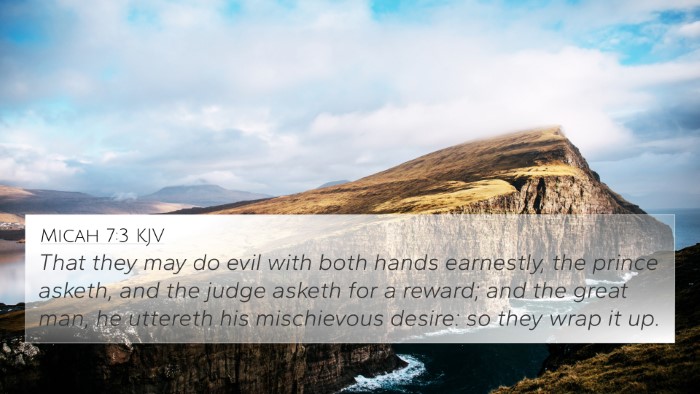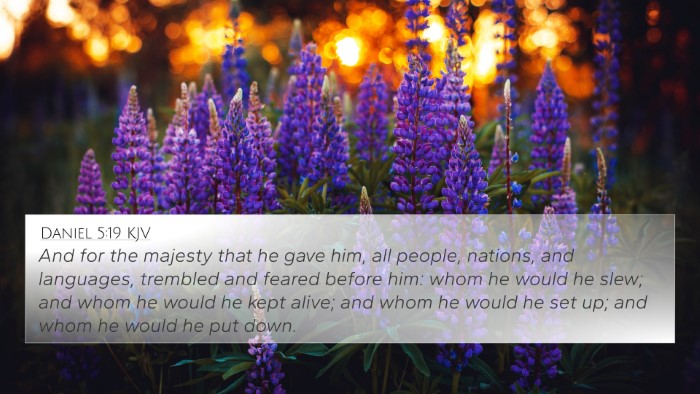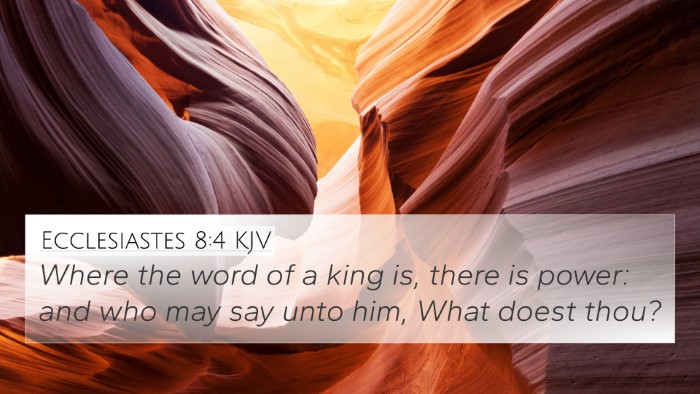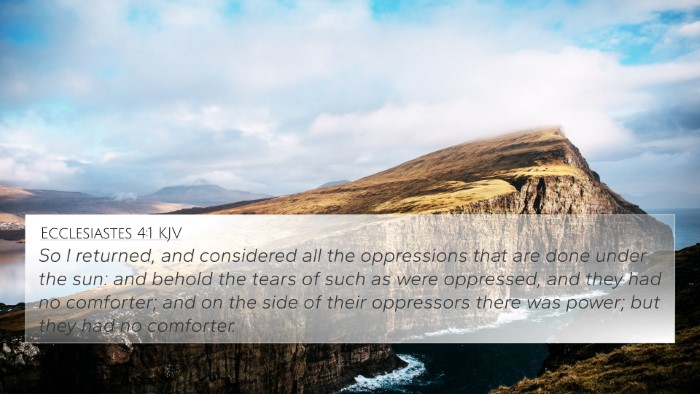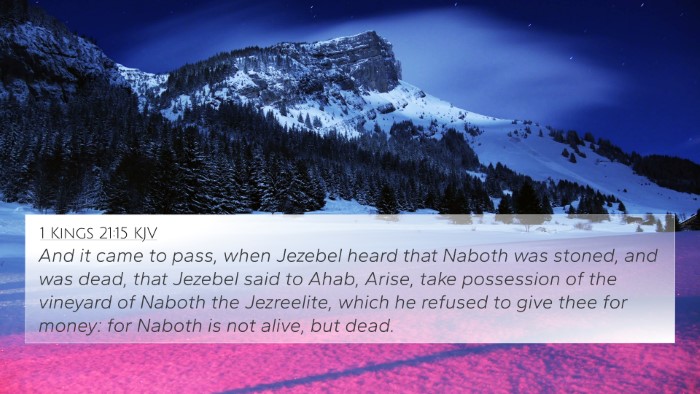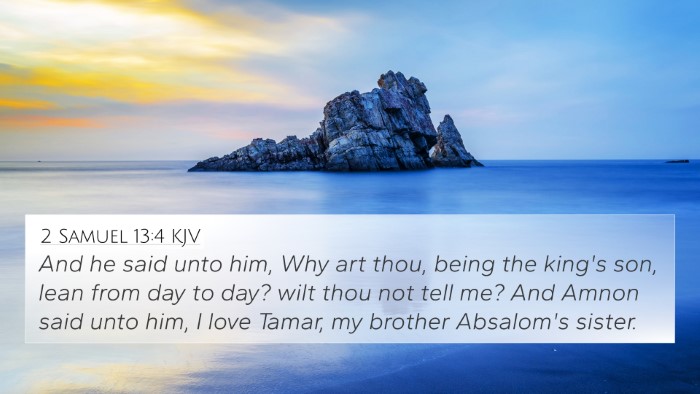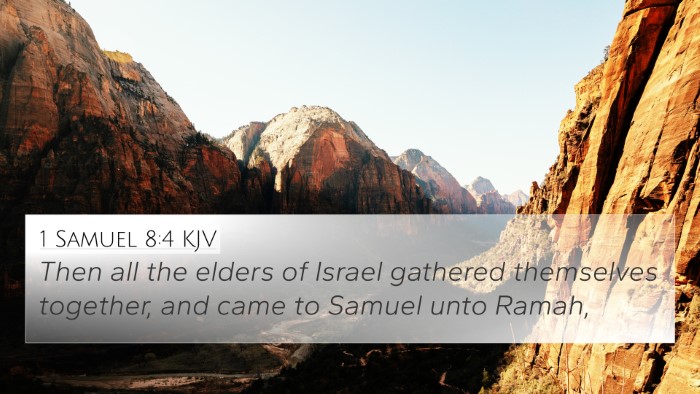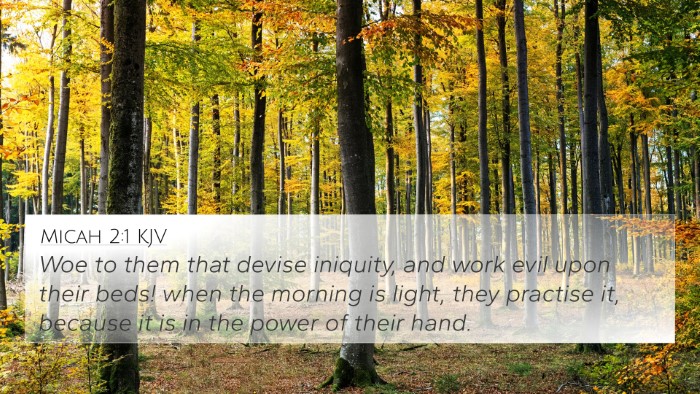Understanding 1 Kings 21:7
"And Jezebel his wife said unto him, Dost thou now govern the kingdom of Israel? arise, and eat bread, and let thine heart be merry: I will give thee the vineyard of Naboth the Jezreelite."
Summary of the Verse
This verse depicts a conversation between Ahab, King of Israel, and his wife, Jezebel. Ahab is distressed over his inability to acquire Naboth's vineyard and laments over it. Jezebel, known for her manipulative and wicked nature, assures Ahab that she will take matters into her own hands to secure the vineyard, thus demonstrating the corrupting influence she has on Ahab and the ease with which wickedness can permeate leadership.
Insights from Public Domain Commentaries
-
Matthew Henry:
Henry emphasizes the desperation and covetousness of Ahab. He portrays Ahab as a weak king who allows his desires to overshadow God's laws. This narrative highlights the dangers of allowing one's desires to be manipulated by outside influences, particularly when dealing with a person like Jezebel.
-
Albert Barnes:
Barnes notes the scheming nature of Jezebel and the depths to which she will plunge to fulfill her husband's desires. He portrays Jezebel's assurance as a deceptive promise that foreshadows the tragic events that will unfold, underlining her role as a primary antagonist in the narrative.
-
Adam Clarke:
Clarke points out the confrontation between moral integrity and the scheming of wickedness. He highlights how Jezebel's manipulative nature contrasts starkly with Naboth's unwavering fidelity to his ancestral property, showcasing the moral decline of Israelite leadership during this period.
Biblical Context
Understanding this verse requires knowledge of the events leading to and following Ahab's request for Naboth's vineyard. Naboth's refusal to sell his vineyard is grounded in the law concerning inherited land (Leviticus 25:23), which adds a layer of tension to the narrative. Jezebel’s arbitrary declaration of Naboth's guilt further illustrates the iron grip of corruption within the royal family.
Cross-References
- 1 Kings 21:1-16: The entire account of Naboth's vineyard, which includes Jezebel’s plot.
- James 4:2: Highlights the nature of covetousness and how it can lead to conflict and strife.
- Exodus 20:17: The commandment against coveting one’s neighbor’s possessions.
- Micah 2:2: A warning against coveting fields and seizing them through deceit.
- 1 Samuel 15:23: Discusses rebellion and stubbornness, which can align with Ahab's character.
- 2 Kings 9:30-37: The eventual downfall of Jezebel, providing a conclusion to her corrupt reign.
- Proverbs 1:8-19: A cautionary passage about the allure of deceitful paths.
- Matthew 5:21-22: Jesus’ teachings on anger which correlate to the motivations behind Jezebel’s actions.
- Jeremiah 22:17: Speaks against those who seek ill-gotten gain, paralleling Jezebel's manipulation.
- Luke 16:10: Discusses faithfulness in little things, which Jezebel and Ahab fail miserably in.
Thematic Connections
This story explores several themes, such as the consequences of unchecked ambition, the corrupting influence of power, and the moral integrity represented by Naboth. It underlines the detrimental effects of influence in leadership and the importance of standing firm in one's convictions against corrupt practices.
Inter-Biblical Dialogue
The narrative of Ahab and Jezebel in 1 Kings 21 dialogues with various themes across Scripture, particularly in the New Testament where discussions of greed, manipulation, and integrity are echoed. There are connections between this story and Jesus' teachings on the heart's desires, showcasing how ancient principles about human nature still resonate today.
Application for Today
The lessons from 1 Kings 21:7 are profound for modern believers. It warns against allowing external pressures, such as societal norms or peer influence, to lead one into wrongdoing. Additionally, it highlights the importance of integrity in leadership and the responsibility those in power have to act justly.
In a world still rife with corruption and manipulation, this passage serves as a call to uphold moral principles and resist the temptation to compromise integrity.
Conclusion
1 Kings 21:7 offers a detailed window into the complexities of human desires and the corrupting nature of power. It challenges readers to reflect on their own lives and leadership practices, urging them to seek righteousness and justice in all dealings.




